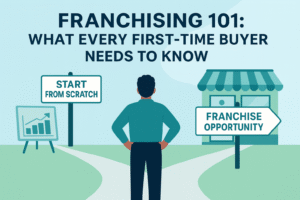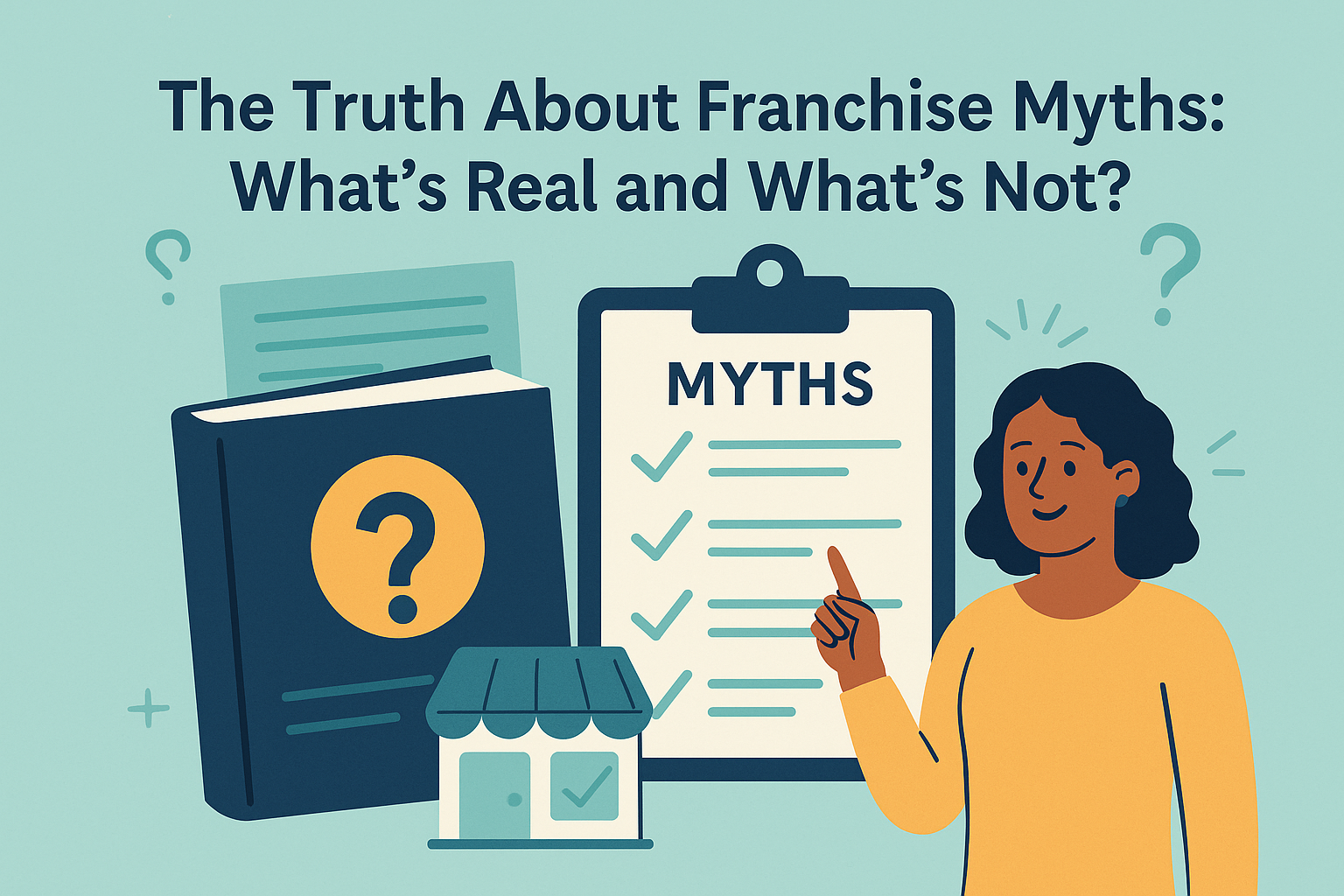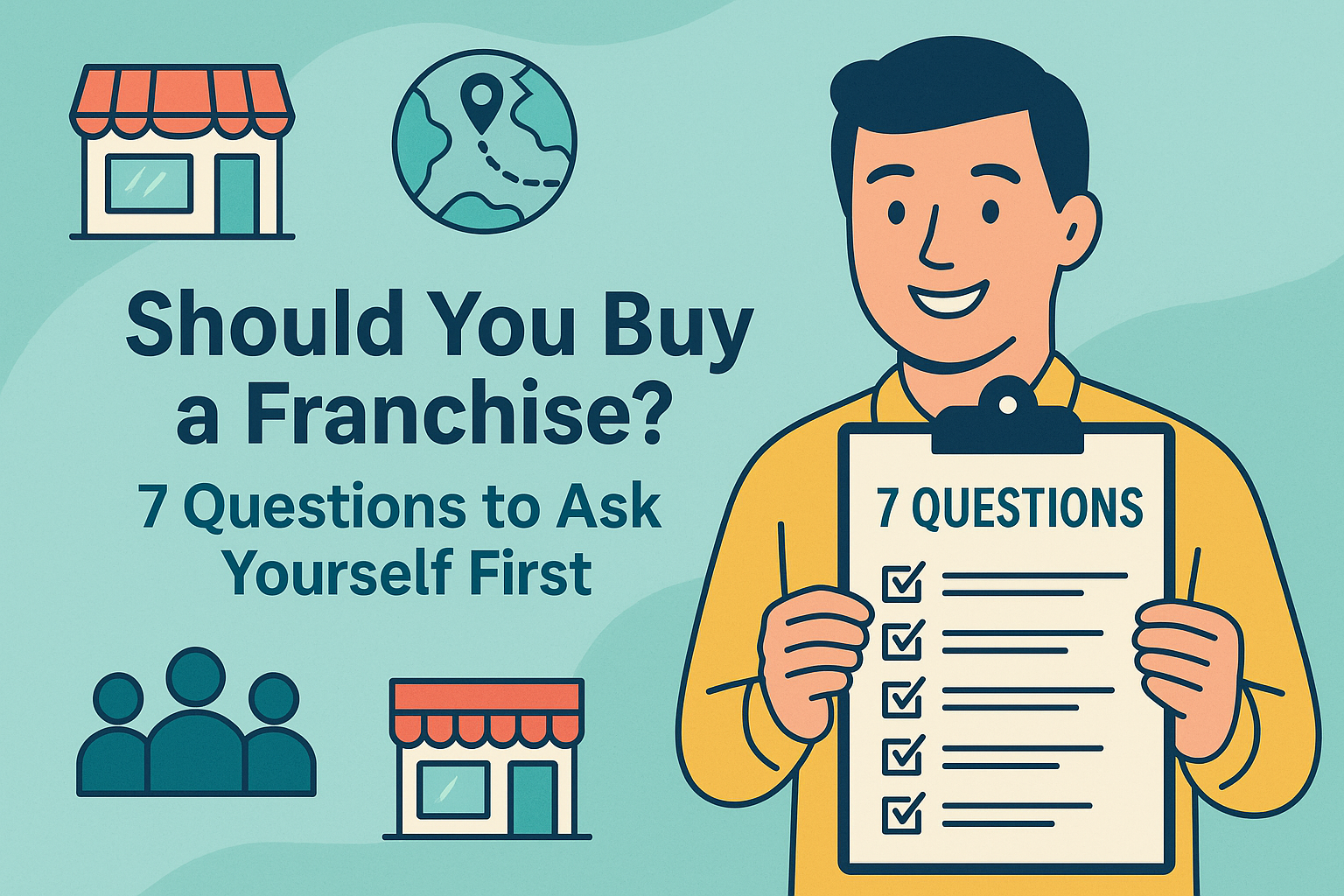Helping Entrepreneurs Build Wealth While Living Their Dreams
Franchising 101: What Every First-Time Buyer Needs to Know

An introduction to the franchise model, pros/cons, and how it compares to starting a business from scratch.
If you’ve ever dreamed of owning your own business but felt overwhelmed by the idea of building one from the ground up, franchising may offer a more approachable path. But before diving into this world, it’s important to understand what a franchise is, how it works, and how it stacks up against launching a brand-new venture.
In this article, we’ll give you a clear, honest look at the franchise model—its structure, its advantages, its drawbacks—and help you decide whether it might be the right fit for your goals.
What Is a Franchise?
At its core, a franchise is a legal and commercial relationship between the franchisor (the brand owner) and the franchisee (you, the local business owner). When you buy a franchise, you’re purchasing the rights to operate a business using the franchisor’s name, branding, systems, and support network.
Think of it as buying into a proven blueprint. Instead of creating your own business plan, brand identity, and customer base from scratch, you’re tapping into an established model with a track record of success.
The Main Players: Franchisor vs. Franchisee
- Franchisor: Develops the brand, provides training, operational systems, marketing resources, and ongoing support.
- Franchisee: Invests capital to open a local unit, manages day-to-day operations, and pays fees (initial and ongoing) to the franchisor.
The relationship is formalized through a Franchise Agreement and governed by a document called the Franchise Disclosure Document (FDD)—we’ll cover those in later posts.
Pros of Buying a Franchise
- Proven Business Model Franchises operate based on systems that have been tested and refined. You’re not guessing what works—you’re following a playbook that has already generated success elsewhere.
- Brand Recognition Customers already know the brand. This familiarity can drive faster customer adoption compared to a completely new business.
- Training & Support Most franchisors offer comprehensive training before you open and ongoing operational support thereafter.
- Marketing Assistance National or regional marketing campaigns, along with ready-to-use promotional materials, can save you time and effort.
- Easier Access to Financing Banks may be more comfortable lending to franchisees of well-known brands because of the reduced risk.
- Community and Peer Network As a franchisee, you’re not alone. Many brands foster strong networks of fellow owners you can learn from.
Cons of Buying a Franchise
- Initial Investment and Ongoing Fees Franchise fees, royalties, and marketing contributions are recurring obligations that cut into profits.
- Less Creative Control You must operate within the franchisor’s system, which limits your flexibility to make changes or innovate locally.
- Shared Brand Reputation Your reputation is tied to the broader brand. A scandal or failure elsewhere in the system could affect your location.
- Contractual Commitments Franchise agreements can be long-term (5–10+ years) and may include non-compete clauses and restrictions on resale.
- Performance Isn’t Guaranteed A franchise isn’t a shortcut to success. Poor management, bad location selection, or economic changes can still lead to failure.
Franchise vs. Starting from Scratch: A Side-by-Side Comparison
| Feature | Franchise | Starting Your Own Business |
|---|---|---|
| Startup Time | Faster due to ready-made systems | Longer—everything is built from zero |
| Support | Training and ongoing help from franchisor | You’re on your own unless you hire help |
| Brand Recognition | Often national or regional | Requires time and investment to build |
| Initial Investment | Can be high but predictable | Variable—can be lower or higher depending on scope |
| Flexibility | Must follow franchisor rules | Total freedom to adapt and pivot |
| Risk Level | Generally lower with proven models | Higher due to lack of proof or structure |
Is Franchising Right for You?
Franchising isn’t a one-size-fits-all solution. It’s ideal for those who:
- Want to own a business but value structure and support.
- Prefer executing a model over creating one from scratch.
- Are financially ready for the investment.
- Can work within rules and brand standards.
If you’re highly entrepreneurial, love constant innovation, or want complete creative control, starting your own independent business might be a better fit.
Final Thoughts
For first-time business owners, franchising offers an appealing mix of independence and support. But like any major decision, it requires careful research and self-reflection. Think of this article as your launching pad—an introduction to the journey ahead.
At Karpata Franchise, we specialize in helping people like you navigate the franchise landscape. Whether you’re curious about your options or ready to start the process, we’re here to provide unbiased guidance every step of the way.
Ready to learn more?
Stay tuned for upcoming posts on how to evaluate franchise opportunities, read a Franchise Disclosure Document, and talk to existing franchisees. Or contact us today for a free consultation.


